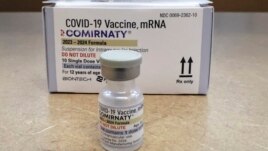02 March 2024
U.S. health officials are urging older adults to get an additional updated COVID-19 vaccine shot.
The advice for Americans 65 and older was recently issued by the U.S. Centers for Disease Control and Prevention (CDC).
A statement by CDC Director Mandy Cohen explained the new guidance. "Most COVID-19 deaths and hospitalizations last year were among people 65 years and older. An additional vaccine dose can provide added protection ... for those at highest risk."

This file images shows Comirnaty, a new Pfizer/BioNTech vaccination booster for COVID-19, is displayed at a pharmacy in Orlando, Fla., on Friday, Sept. 15, 2023. (Joe Burbank/Orlando Sentinel via AP)
The CDC said an additional dose of the vaccine can provide increased protection, even if older adults received the updated shot version launched last autumn.
The new guidance suggests individuals who did receive the updated shot – which became available last September – should wait at least four months before getting the latest dose.
The CDC's decision, or recommendation, came after much debate over whether to say older people "may" get the shots or "should" do so. That discussion demonstrates the ongoing debate among experts about how necessary additional COVID-19 shots are.
Some doctors have said they think most older adults are effectively protected after getting the shot last autumn. And studies have suggested the shots stay effective for six months.
But health officials have noted the body's vaccine-activated defenses can decrease over time, especially in older people. The CDC had recommended additional COVID-19 shots, called boosters, for older adults in 2022 and 2023.
COVID-19 can still present serious health risks, especially to older people and those with existing medical conditions. The CDC says there are still more than 20,000 hospitalizations and more than 2,000 deaths each week from COVID-19. Individuals 65 years and older have the highest hospitalization and death rates.
Some members of the CDC group that approved the latest advice said the word "should" in the guidance is meant to persuade more doctors and drug stores to offer the shots.
"Most people are coming in either wanting the vaccine or not," Dr. Jamie Loehr told The Associated Press. He is a member of the CDC's deciding committee and a family doctor in Ithaca, New York. "I am trying to make it easier for providers to say, ‘Yes, we recommend this.'"
In September, the government ordered a new COVID-19 shot based on a version of the virus called XBB.1.5. That single-target vaccine replaced combinations that had targeted both the first COVID-19 version and a much earlier Omicron version.
The CDC recommended that vaccine version for everyone 6 months and older. It also urged people with weak immune systems to get a second shot up to two months after the first.
But most Americans did not listen to that advice. The latest CDC data shows that 13 percent of U.S. children got the shots, while 22 percent of U.S. adults did. The vaccination rate for adults 65 and older is higher, at nearly 42 percent.
"People are tired of getting all these shots all the time," Dr. David Canaday told the AP. He is an infectious diseases expert at Case Western Reserve University in Cleveland, Ohio.
Canaday, who does not serve on the CDC's advisory group, added, "We have to be careful about over-recommending the vaccine."
I'm Bryan Lynn.
The Associated Press and Reuters reported on this story. Bryan Lynn adapted the reports for VOA Learning English.
_____________________________________________
Words in This Story
update – v. add new information to something
dose – n. the amount of medication to be taken at one time
immune system – n. the cells and tissues in the body that fight against infection